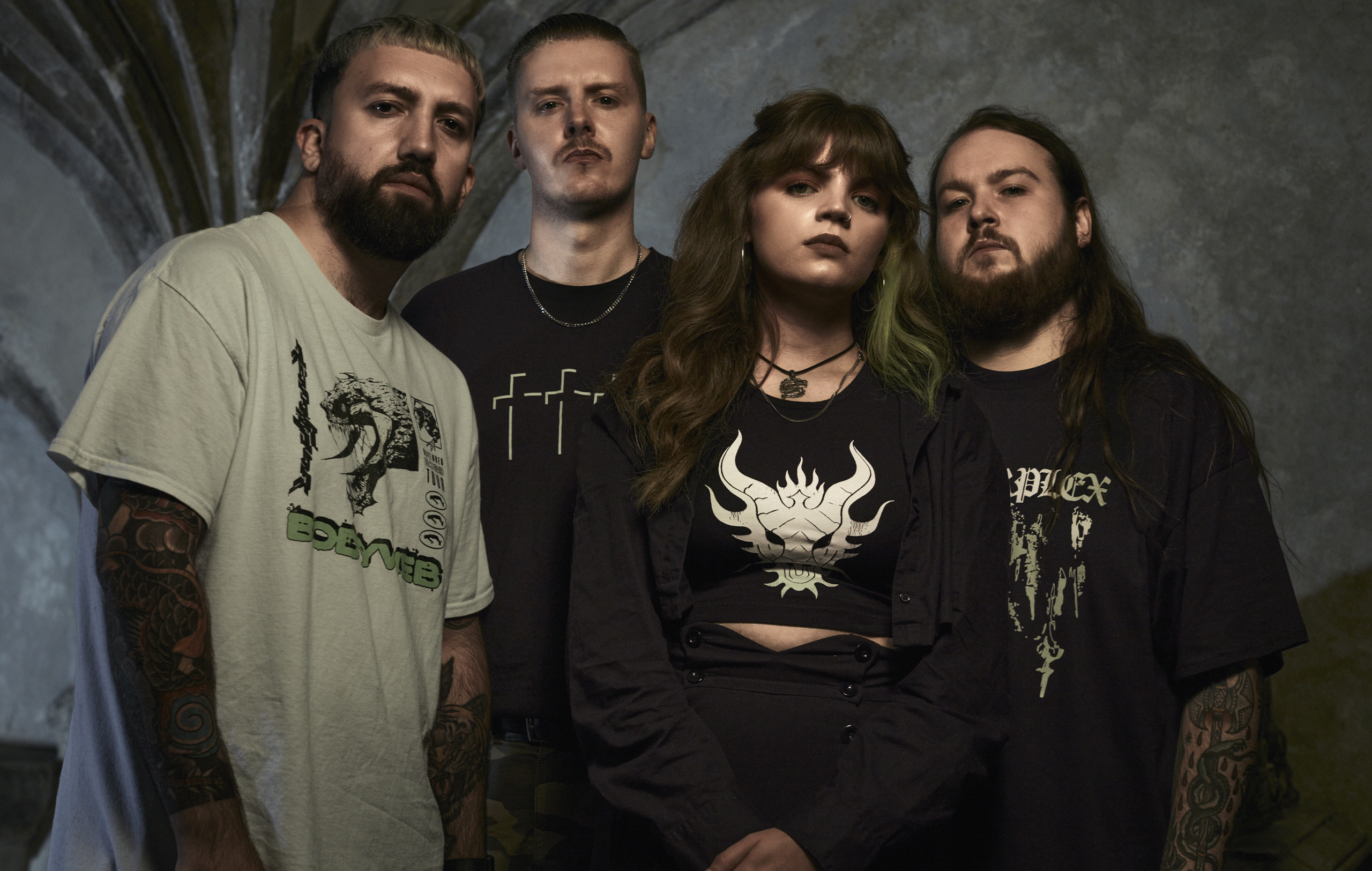There’s no proving ground for a band quite like the stage. Just ask British metallers Heriot. They stormed out of lockdown with their 2022 debut EP, ‘Profound Morality’, melding heaviness, ambience and eerie atmospherics into a volcanic sound that quickly caught the attention of fans and peers alike. It was when they started putting the miles in on the road, however, they transformed from bright new hopes into the modern metal behemoths they are now on their fiery debut album ‘Devoured By The Mouth Of Hell’.
Heriot on The Cover of NME. Credit: Tom Oxley for NME
The quartet released their official debut single in 2020, though three of its members – vocalist and bassist Jake Packer, guitarist Erhan Alman and drummer Julian Gage – met at school five years prior in Swindon. Debbie Gough, who hails from Birmingham, met them on the touring circuit while in a different band and later joined as vocalist and guitarist.
“We wrote ‘Profound Morality’ during lockdown, so there was not even the thought of live shows,” Alman tells NME. When they got to bring it to a live audience, however, they truly blossomed. You can witness Heriot’s nuanced, multi-dimensional sonic brutality in sharper focus live, and their determination to open the pit up is impossible to miss, from how Alman snarls as he bashes his strings to the way Gough throws herself forwards as she shreds, screaming commands at the crowd. They’ve conquered premier rock and metal festivals like Download, Rock Am Ring and Copenhell – and flown the flag for metal at unlikelier settings like Slam Dunk and Standon Calling.
“The world gets more and more grey as you get older – it’s not black and white. How do you navigate that?” – Debbie Gough
Heriot began laying the groundwork for their debut album last March, but after a summer stuffed with shows – including a pivotal European run supporting Architects – they found that the material they’d written no longer reflected who they were. Made wiser and more experienced by their time on the road, it appeared that they’d outgrown it. They returned to the studio in November, ultimately discarding the bulk of their previous material while rewriting and reworking what remained. “I always find it a bit mental how important that period was for us to come back and rewrite these tunes,” says Alman.
Working on their first full-length album presented Heriot an opportunity to paint with more colours. Everything, this time around, feels bigger. The towering opener ‘Foul Void’ feels apocalyptically expansive, while ‘At The Fortress Gate’ thunders along with the ferocity of metal forebears such as Lamb of God. By contrast, the creeping, smouldering ‘Opaline’ strikes a different tone, Gough’s chilling clean vocals matching the slower, but only just slightly softer sound. Here, Heriot wield their savagery carefully.
Debbie Gough of Heriot. Credit: Tom Oxley for NME
Helping Heriot channel the lessons from the road into an incendiary record was their producer Josh Middleton, frontman of Sylosis and former Architects guitarist. “When we were recording, Josh was trying to emphasise how we need to have bits to come back to that will stick with people live,” explains Gough. “[Lead single] ‘Siege Lord’ is one of the first songs, I think, that we’ve done with a proper chorus. He was trying to emphasise to us the importance of that, and the importance of holding onto a riff for a little bit longer, so that it translates live.”
The goal, Alman adds, was to write music so people could “walk past at a festival, hear a riff and just get sucked in by it”. It had to sound like something nobody could ignore. On ‘Devoured By The Mouth Of Hell’, Heriot understood the assignment.
Erhan Alman of Heriot. Credit: Tom Oxley for NME
Matching Heriot’s ominous, dramatic tones are lyrics that have always been cloaked in mystery and songs whose meanings are rarely obvious and deliberately left open to interpretation. Lead single ‘Siege Lord’ seems almost medieval or pagan, while ‘At The Fortress Gate’ goes to similarly dark yet fantastical places, with Packer detailing “torn fragile membrane/Pulled from bone and skin/Avalon beckons as you burrow through disease.”
“I think as people, we’re quite happy – we’d never conduct ourselves the way we do in our music,” Gough tells NME in her amiable Brummie accent – a far cry from the lethal screams and shiver-worthy, siren-like singing voice she brings to Heriot’s songs.
The cataclysmic mood of their music leaches out of Heriot almost subconsciously, it seems. “I think we’ve probably just taken in a lot from other influences, be it the world and what’s going on, or other genres of music and then just passively put it into our music, not even thinking about it, and it just gets darker and darker,” Packer says. “I guess that’s quite a good way to get that out of you. If everything was happy and peaceful and good, then we’d probably make really happy music.”
“A lot of people are realising they need something a bit harder, abrasive and raw in their life” – Jake Packer
“I always laugh when I read Jake’s lyrics compared to mine, because they’re so often about the same things. It’s really silly, how we both end up having the same train of thought,” Gough says, before pondering the origins of the dark, philosophical themes behind her writing.
“As you get older, you start to realise that not everybody has the same experiences,” she adds. “Just because you experience something doesn’t mean that everybody else does, and the luck of the draw of being born the person that you are, versus other circumstances that other people live in. The world gets more and more grey as you get older – it’s not black and white. How do you navigate that?”
Such open-ended, existential questions lend themselves neatly to metal, a genre that’s denser and less accessible than most – and one that’s in rude health at the moment. Even the mainstream is leaning into it: Post Malone’s collaborated with Ozzy Osbourne, while earlier this year Megan Thee Stallion enlisted Spiritbox for a heavy remix of ‘Cobra’.
Julian Gage of Heriot. Credit: Tom Oxley for NME
The UK, meanwhile, has been particularly fertile ground for metal, especially post-pandemic. Sleep Token have been catapulted from cult sensations to international, arena-filling successes, while other UK peers including Liverpool alt-metallers Loathe and London genre-smashing duo Wargasm have been making huge waves both at home and abroad. And there’s more where that came from too, if the success and adulation following metallic hardcore heroes Ithaca, mathcore mob Pupil Slicer, or Midlands metal titans Conjurer is anything to go by.
“A lot of people are realising they need something a bit harder or more abrasive and raw in their life,” theorises Packer. “Metal gives that on a plate. It’s not as commercialised and people are discovering that there’s more [music out there] than just what’s in front of them. Metal’s great for that, because you can find one band and that’s your gateway to a whole genre.”
Jake Packer of Heriot. Credit: Tom Oxley for NME
Now that Heriot have learned what it takes to craft a debut album for the ages, they’re going to, once again, take their material out on the road. Their final months of 2024 will be spent out on a UK and European run opening for Fit For An Autopsy and Sylosis, where they’ll introduce themselves to legions more potential future fans.
How do Heriot feel, knowing that so many eyes are on them now?
“I think there’s always pressure on you whenever you do anything in life, and especially if it’s something that means a lot to you, there comes responsibility and expectations,” says Gough. “I think that definitely played a part. But overall, we were more excited [than feeling pressured] because we knew the things that we wanted to do differently.
“Ultimately, you’re in a band because you want to make music. We try to have that in our brains more than going into the studio to make an album that’s going to sell a million copies. It’s more about making a body of music that you feel proud of, and you feel is like a best representation of your band.”
“We really want to pursue this. We don’t think we could imagine our lives without it” – Erhan Alman
Heriot’s recent ascent might have been rapid, but in other ways, they’ve kept themselves grounded. They’ve worked with the same driver and drum recordist, who Alman, Gage and Packer knew from school, their entire career. Their growth has also been intertwined with the career of their longtime photographer Harry Steel, who has gone on to work with the likes of Creeper and Fall Out Boy but continues to experiment with Heriot and their ominous visual universe. “It’s quite rewarding seeing the team do so well,” remarks Packer. “You’re not going to have a bad time with those people on your side helping you do the things you want to do.”
Working full-time jobs while managing their band also can’t help but keep the four musicians down to earth. For now, Heriot still ride a pendulum that swings from the euphoria of high-octane shows and new artistic milestones to the reality of the grind.
“I used to really struggle with it,” admits Gage. “[Playing shows] is kind of a high, and then you come home, and it’s the opposite of what you’ve been doing out on the road. If anything, it makes you want to work harder towards music, to make that a full-time job. It’s only going to get harder next year, once the album’s out.”
“We’ve always got things to look forward to,” Alman chimes in. “We really want to pursue this. We don’t think we could imagine our lives without it.”
Heriot’s album ‘Devoured By The Mouth Of Hell’ is out now via Century Media.
Listen to Heriot’s exclusive playlist to accompany The Cover below on Spotify and here on Apple Music.
Words: Emma Wilkes
Photography: Tom Oxley
Label: Century Media
The post Heriot are ready to raise hell appeared first on NME.




